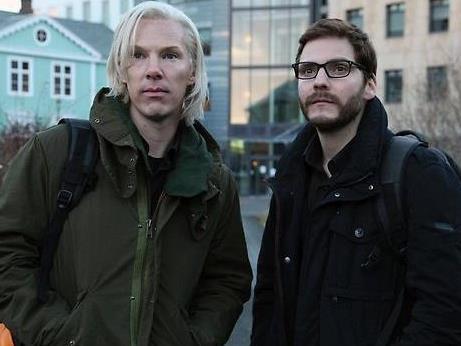Bill Condon’s cinematic treatment of the WikiLeaks website’s ascension to the status of accepted alternative media source – and, more specifically, Julian Assange’s role as its founder, driving force and public figure – is not short on content or rhetoric, much of it driven by the man in question. And yet, as it takes its accounts of real-life events from Daniel Domscheit-Berg’s Inside WikiLeaks: My Time with Julian Assange and the World’s Most Dangerous Website and David Leigh and Luke Harding’s WikiLeaks: Inside Julian Assange’s War on Secrecy, the feature never quite knows what it wants to be.
Most prominent in Josh Singer’s screenplay is the prevailing, oft-spouted view on whistleblower haven and its creator – the view splashed across the news, be it papers, sites or broadcasts, for the better part of the past five years. Indeed, it is in the already reported – at length, and en masse – that the film dwells for its entire 128-minute duration. Every detail, dilemma, argument and allegation has been repeated and is still readily available for the re-living. Preceding films Underground: The Julian Assange Story and We Steal Secrets: The Story of WikiLeaks have already covered the same territory to varying degrees.
Of course, as Assange (Benedict Cumberbatch, Star Trek Into Darkness) evolves through the many stages of his “Robin Hood of information” persona in grimy, grey-lit international locales, the film’s allegiance shifts with it, with his one-time partner-in-crime Domscheit-Berg (Daniel Brühl, Rush) increasingly the more sympathetic presence. From their first meeting in 2007, to the publication of the classified U.S. military documents supplied by Bradley Manning, The Fifth Estate charts their verbal and ideological sparring – the former obsessed with freedom of all information at any cost, the latter initially complicit in Assange’s crusade, but ultimately swayed by wanting to do the right thing.
With unnecessary visualisations of the tech-savvy, internet-dominated world its characters and content source resides in, as well as clunky realisations of metaphors that can only seem clumsy, the otherwise polished film bounces between the men – at times on board with Assange’s efforts, but always returning to Domscheit-Berg’s cautious perspective. In doing so, it aims to understand and condemn all at once, with the balance between the two never attained. The morality at play is cast only in black and white; the many conversations about truths and secrets amount to little more than attempted emotive filler; the subplots, endeavouring to show the cost of the site’s actions, are too overt to be effective; the overload of information, whilst apt, can’t sustain interest.
In the midst of the uncertain offering sits a pair of fine performances, the actors rising above the rote material and wavering tone. Although the air of impersonation is evident, Cumberbatch commands attention as Assange, physicality, accent, expressions and all; in his second impressive turn in as many months, Brühl brings softness to his role as the relatable, approachable counterpart. Recognisable names – Laura Linney (Hyde Park on Hudson), Stanley Tucci (Percy Jackson: Sea of Monsters), Anthony Mackie (Runner Runner), David Thewlis (RED 2) and Peter Capaldi (World War Z) among them – round out the cast as government pawns and The Guardian’s power players, but this is Cumberbatch and Brühl’s movie. Indeed, as it unconvincingly intertwines an origin story with an indictment of motives and methods, that’s perhaps the only thing that’s assured in the entire feature.
Rating: 2.5
The Fifth Estate
Director: Bill Condon
US / Belgium, 2013, 128 mins
Release date: November 14
Distributor: Disney
Rated: M
